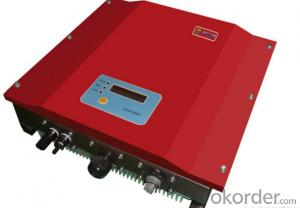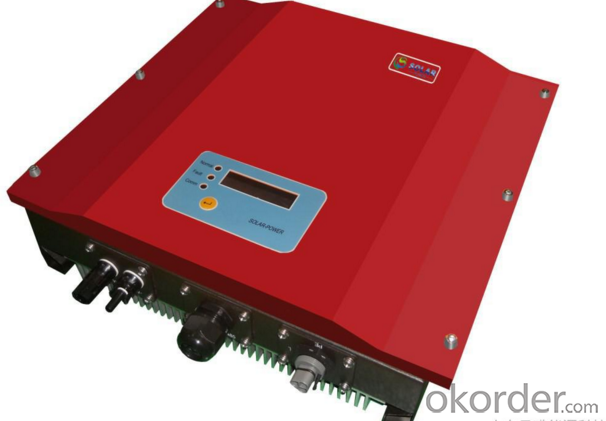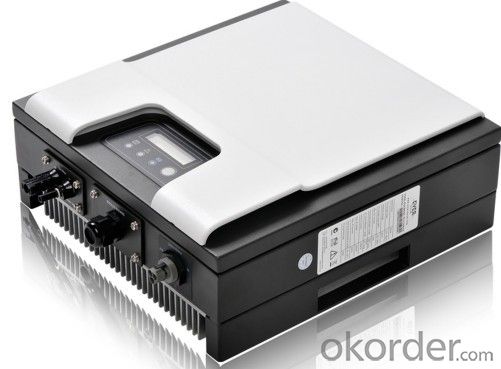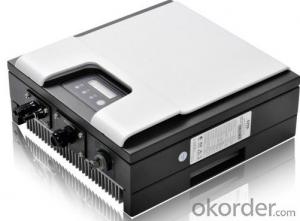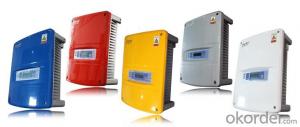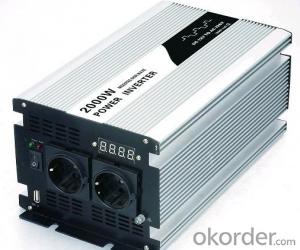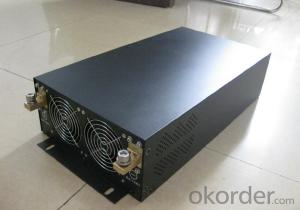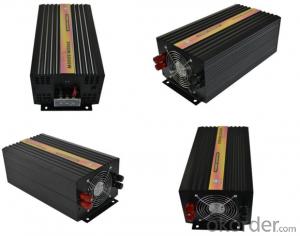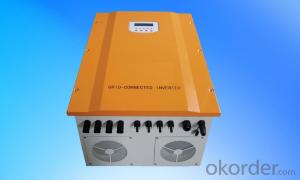Solar Inverter 500w - Three Phase 20k Solar Inverter Made in China
- Loading Port:
- Shanghai
- Payment Terms:
- TT OR LC
- Min Order Qty:
- 0 watt
- Supply Capability:
- 10000 watt/month
OKorder Service Pledge
OKorder Financial Service
You Might Also Like
Description of Three Phase 20k Solar Inverter
Solar ac power system consists of solar panels, charge controllers, inverter and battery; Solar energy does not include inverter dc power system. Inverter is a kind of power conversion device, inverter by incentives can be divided into self-excited oscillation inverter and separately excited oscillation inverter.
Features of Three Phase 20k Solar Inverter
Including three series,7 models
Both economical and high effciency
Smaller and lighter, 20Kw-TL weighs only 45kg
External Inductor
LCD screen with four buttons
Ethernet wifi or GPRS cascade data communication technology
User, installer, distrbutor, Omnik headquarter all-round remote control
Meets VDE-AR-N4105,BDEW approval
Built-in lightning protection module as an option
Advantages of Three Phase 20k Solar Inverter
Meets all the needs of medium power three phase inverter
Economy, high reliability and long life circle
Convenient to transport and install
Reducing machine temperature, extends device lifetime
Easy to operate, user friendly
One power station needs only one monitoring equipment
Real-time operation condition accessible, fast fault responding speed
Adjustable active and reactive power
Built-in lighting protection module
Technical Data of Three Phase 20k Solar Inverter
| Type | Omniksol-20k-TL |
| Input(DC) | |
| Max.PV Power | 21200W |
| Max,DC Voltage | 1000V |
| Nominal DC Voltage | 640V |
| Operating MPPT Voltage Range | 250-850V |
| MPPT Voltage Range at Nominal Power | 480-850V |
| Start up DC Voltage | 300V |
| Turn off DC Voltage | 250V |
| Max, DC Current(A/B) | 22A/22A |
| Max, Short Cicuit Current for each MPPT | 25A/25A |
| Number of MPP trackers | 2 |
| Max, Input Power for each MPPT* | 5000W |
| Number of DC Connection | A:3/B:3 |
| DC Connection Type | MC4 connector |
| Output(AC) | |
| Max,AC Apparent Power | 19200VA |
| Nominal AC Power (cos phi = 1) | 19200W |
| Nominal AC Voltage | 3/N/PE;220/380V |
| 3/N/PE;230/400V | |
| 3/N/PE;240/415V | |
| Nominal Grid Frequency | 50Hz/60Hz |
| Max, AC Current | 29.0A |
| Grid Voltage Range** | 185-276V |
| Grid Frequency Range** | 45-55Hz/55-65Hz |
| Power Factor | 0.9 capacitive... 0.9 inductive |
| Total Harmonic Distortion(THD) | <2% |
| Feed in Starting Power | 60W |
| Night time Power Consumption | <1W |
| Standby Consumption | <12W |
| AC Connection Type | Plug-in connertor |
| Efficiency | |
| Max,Efficiency | 98.2% |
| Euro Efficiency | 97.8% |
| MPPT Efficiency | 99.9% |
| Safety and Protection | |
| DC Insulation Monitoring | Yes |
| DC Switch | Optional |
| Residual Current Monitoring Unit (RCMU) | Integrated |
| Grid Monitoring with Anti-islanding | Yes |
| Electricity Fuse Protection | Yes |
| Protection Class | Ⅰ(According to IEC 62103) |
| Overvoltage Category | PV Ⅱ/ Mains Ⅲ(According to IEC 62109-1) |
| Reference Standard | |
| Safety Standard | EN 62109, AS/NZS 3100 |
| EMC Standard | EN 6100-6-1, EN 6100-6-2, EN 6100-6-3 EN 6100-6-4, EN 6100-3-2, EN 6100-3-3 |
| Grid Standard | VDE-AR-N4105. VDE-0126-1-1,G83/1,EN 50438,RD1699,CEI 0-21, AS4777,C10/C11 |
| Physical Structure | |
| Dimensions | 575x650x248mm |
| Weight | 45kg |
| Environmental Protection Rating | IP 65 (According to IEC 60529) |
| Cooling Concept | Natural convection |
| Mounting Information | Wall bracket |
| General Data | |
| Operating Temperature Range | -25℃ to +60℃(derating above 45℃) |
| Relative Humidity | 0% to 98%, no condensation |
| Max. Altitude (above sea level) | 2000m |
| Noise Type | <45dB |
| Isolation Type | Transformerless |
| Display | TFT Graphic Display |
| Data Communication | RS485(WiFi, GRPS optional) |
| Computer Communication | RS485(USB) |
| Standard Warranty | 10 Years (5-15 years optional) |
IMages of Three Phase 20k Solar Inverter
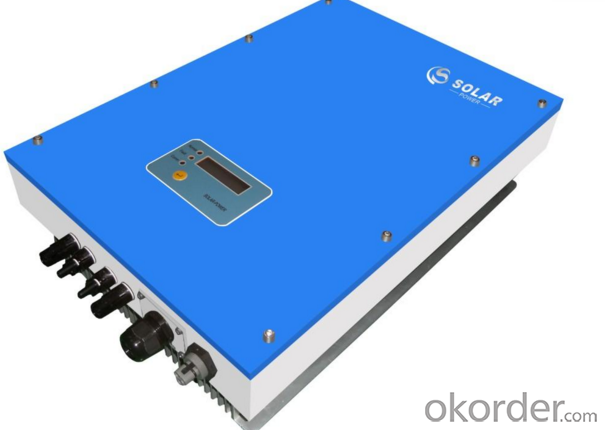
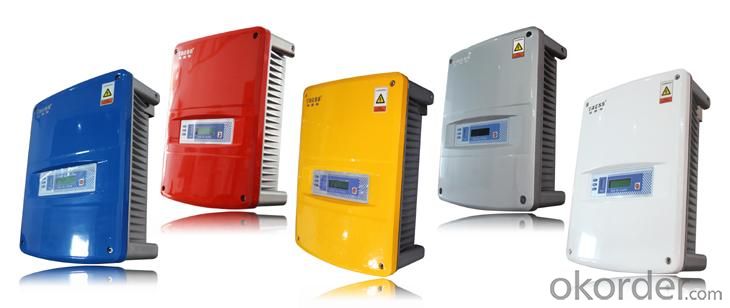
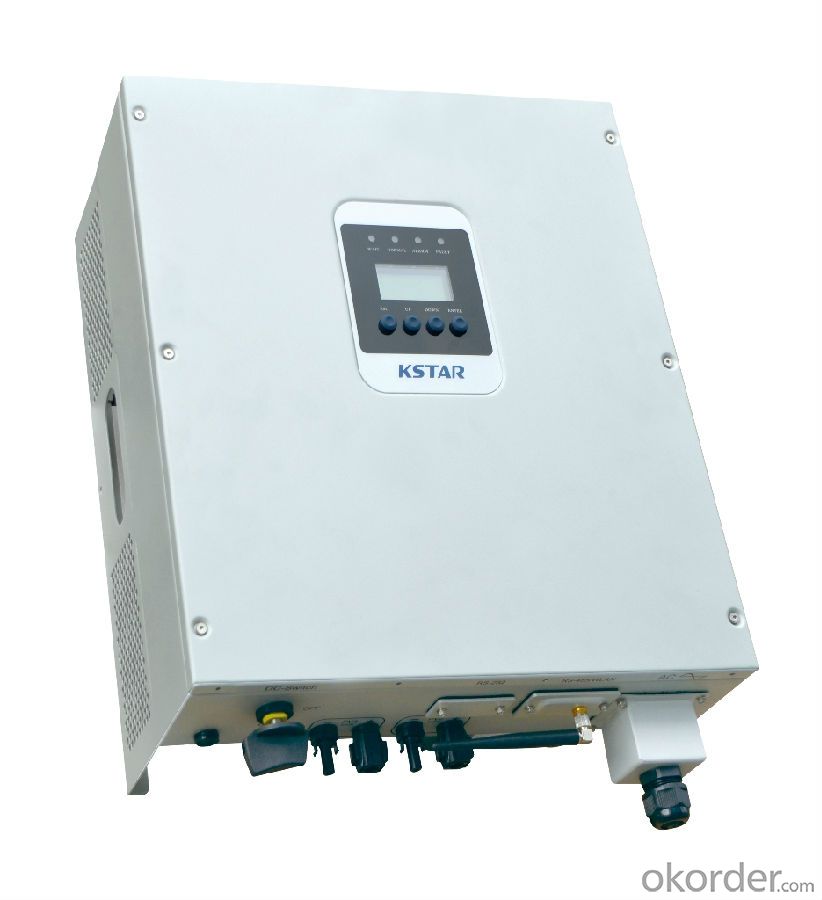
FAQ
Q: Do you have the CE, TUV, UL Certification?
A: We’ve already passed all the tests, and any certificate is available.
Q: Have you ever sold your products to companies in my country?
A: Of course, we have customers in all general PV markets, but I think we should expand our market share along with the market growth.
Q: When did your company set up? You are a new company, how can I believe your quality?
A: We entered into Solar PV industry in 2005, now we have several plants in manufacturing of a-Si and c-Si panels, and our capacity is 220MW per year. Till now we have already passed all the tests by authorized laboratories, e.g. TUV, CE, UL.
Q: Can you help us install the module if we cooperate with you?
A: We haven’t entered into installation sector, but we have the plan in near future.
Q: How do you pack your products?
A: We have rich experience on how to pack the panels to make sure the safety on shipment when it arrives at the destination.
Q: Can you do OEM for us?
A: Yes, we can.
Q: Can we visit your factory?
A: Surely, I will arrange the trip basing on your business schedule.
- Q: Can a solar inverter be used with a backup power supply (UPS)?
- Yes, a solar inverter can be used with a backup power supply (UPS). The solar inverter can convert the DC power produced by solar panels into AC power, while the UPS can provide backup power in case of a utility grid failure. This combination allows for uninterrupted power supply, even during power outages.
- Q: How does the efficiency of a solar inverter affect the overall system performance?
- The efficiency of a solar inverter plays a crucial role in determining the overall performance of a solar system. A higher efficiency inverter converts a greater percentage of the energy generated by the solar panels into usable electricity. This means that less energy is lost as heat, resulting in more electricity being available for consumption. A more efficient inverter translates into increased energy production, reduced reliance on grid power, and ultimately, higher cost savings. Additionally, a highly efficient inverter enhances the stability and reliability of the system, ensuring optimal performance and longevity.
- Q: Can a solar inverter be used with solar-powered desalination systems?
- Yes, a solar inverter can be used with solar-powered desalination systems. A solar inverter is responsible for converting the direct current (DC) produced by solar panels into alternating current (AC) that is required for the operation of desalination systems. By integrating a solar inverter, solar energy can efficiently power the desalination process, making it a sustainable and eco-friendly solution for water purification.
- Q: How does a solar inverter handle voltage fluctuations from the battery bank?
- A solar inverter handles voltage fluctuations from the battery bank by utilizing its built-in control mechanisms and electronics. These components monitor the voltage output of the battery bank and regulate it to ensure stable and consistent voltage levels. This helps prevent any sudden or drastic fluctuations that could potentially damage electrical equipment or disrupt the functioning of the system.
- Q: What certifications should a solar inverter have?
- A solar inverter should have certifications such as UL 1741, IEC 62109, and IEEE 1547 to ensure its safety, reliability, and compliance with industry standards. Additionally, certifications like ISO 9001 and ISO 14001 can demonstrate the manufacturer's commitment to quality and environmental management.
- Q: How does a solar inverter handle islanding detection and prevention?
- A solar inverter handles islanding detection and prevention by constantly monitoring the grid and its own power output. If it detects a loss of grid connectivity, it initiates a process called anti-islanding, where it stops supplying power to the grid to prevent the formation of an island. The inverter accomplishes this by monitoring the frequency and voltage levels of the grid, and if it detects a deviation beyond a certain threshold, it disconnects from the grid within a specific timeframe. This ensures that the inverter does not continue to supply power to an isolated grid, which could pose safety risks to utility workers and damage electrical equipment.
- Q: The working principle of photovoltaic grid - connected inverter
- Inverter will be converted into alternating current DC, if the DC voltage is low, then through the AC transformer boost, that is, the standard AC voltage and frequency. For large-capacity inverter, because the DC bus voltage is high, AC output generally does not require transformer boost that can reach 220V, in the small and medium capacity of the inverter, because the DC voltage is low, such as 12V, 24V, It is necessary to design a boost circuit.
- Q: What is the role of a fault detection feature in a solar inverter?
- The role of a fault detection feature in a solar inverter is to monitor and identify any abnormalities or malfunctions in the system. This feature plays a crucial role in ensuring the reliable and efficient operation of the solar inverter. A fault detection feature is designed to constantly monitor the various components and parameters of the solar inverter, including input voltage, output voltage, current levels, temperature, and other critical parameters. It analyzes the data in real-time and compares it with predefined thresholds or expected values. If any parameter deviates from the normal range or exceeds the set limits, the fault detection feature immediately identifies it as a fault or abnormality. The primary purpose of this feature is to protect the solar inverter from potential damage and prevent any possible safety hazards. By promptly detecting faults, it enables the inverter to take appropriate actions to mitigate the issue or to shut down the system if necessary. This helps in avoiding further damage to the inverter or other connected devices. Additionally, the fault detection feature aids in troubleshooting and diagnosing the root cause of the fault. It provides valuable information about the type and location of the fault, facilitating quicker and more accurate repairs or maintenance. This reduces downtime and ensures the optimal performance and longevity of the solar inverter. Furthermore, the fault detection feature plays a vital role in system monitoring and maintenance. It provides valuable data and alerts to the system operator or maintenance personnel, enabling them to proactively address any potential issues. This helps in maximizing the uptime of the solar inverter and minimizing the overall maintenance costs. In summary, the fault detection feature in a solar inverter is responsible for continuously monitoring, identifying, and responding to any faults or abnormalities in the system. It acts as a protective mechanism, ensuring the safe and reliable operation of the inverter, enabling quick troubleshooting, and facilitating efficient maintenance practices.
- Q: Can a solar inverter be used with a solar-powered water desalination system?
- Yes, a solar inverter can be used with a solar-powered water desalination system. A solar inverter is responsible for converting the direct current (DC) generated by solar panels into alternating current (AC) that can be used to power various electrical devices, including a water desalination system. By connecting the solar panels to the solar inverter and then to the water desalination system, the renewable energy produced by the sun can be harnessed and utilized efficiently for the desalination process.
- Q: What is the role of isolation in a solar inverter?
- The role of isolation in a solar inverter is to provide electrical safety and protect sensitive electronic components. It helps to separate the direct current (DC) input from the alternating current (AC) output, ensuring that any faults or fluctuations in one do not affect the other. Isolation also prevents any potential ground faults, reducing the risk of electric shock and improving system reliability.
Send your message to us
Solar Inverter 500w - Three Phase 20k Solar Inverter Made in China
- Loading Port:
- Shanghai
- Payment Terms:
- TT OR LC
- Min Order Qty:
- 0 watt
- Supply Capability:
- 10000 watt/month
OKorder Service Pledge
OKorder Financial Service
Similar products
Hot products
Hot Searches
Related keywords
